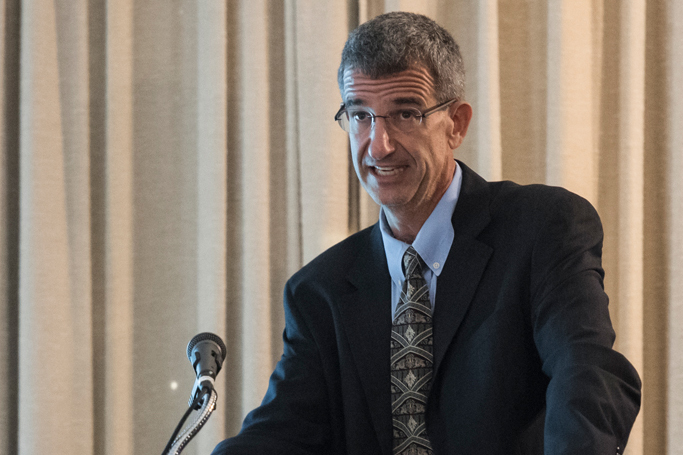The Fourteenth Amendment is perhaps the “most important of the Constitution because it is central to engage in constitutional law,” suggested historian Michael Vorenberg during his lecture, “The Fourteenth Amendment as an Act of War,” at BC Law in September. His visit, sponsored by the Clough Center for the Study of Constitutional Democracy, was aptly planned to celebrate Constitution Day as well as the 150th Anniversary of the Civil Rights Act and Fourteenth Amendment.
Vorenberg is an associate professor of history at Brown University. His most famous work, Final Freedom: the Civil War, the Abolition of Slavery, and the Thirteenth Amendment, was a finalist for the Lincoln Prize and was also generously used for Steven Spielberg’s 2012 film, Lincoln.
The historian’s current work moves chronologically to the Fourteenth Amendment and engages concerns about the end of the Civil War and its impact on US citizenship. In this vein, he traced the Fourteenth Amendment from creation of wartime necessity to contemporary application.
Vorenberg began his lecture by resolving the myth of the “magical moment at the Appomattox,” where Robert E. Lee “surrendered” to Ulysses S. Grant in April 1865 at the famed Virginia courthouse. Though popular imagination assumes the Civil War ended there, the legal conclusion to the war actually came 16 months later on August 20, 1866. Similarly confounded is the Fourteenth Amendment which, though not ratified until 1868, was passed for resolution on June 13, 1866.
Thus, Vorenberg revealed, the amendment which secures birthright citizenship and due process of law to all Americans, was an act of war and not a measure of peacetime Reconstruction. Rethinking the amendment in this way, opens nuanced dialogue for its contemporary application, he argued.
Key support for Vorenberg’s argument was language—the use and reuse of phrases across legal documents, as well as the implications of such rhetoric. Primarily, he said, the narrative of the Fourteenth Amendment cannot be separated from the Civil Rights Act of 1866. The act not only attached rights and citizenship to the grant of freedom for black people, it also charged the federal government with responsibility to react, and most importantly, act preemptively against conspired violations of civil rights.
This language borrowed heavily from the rhetoric of international law. Used from the Caroline Incident of 1837 to President Bush’s preemptive actions against terrorist activity in 2001, the language of the Doctrine of Preemptive War also shaped the Civil Rights Act and the Fourteenth Amendment.
Vorenberg illuminated the implications of understanding the Civil Rights Act and the Fourteenth Amendment as wartime acts, imploring the audience to give the Doctrine of Preemptive War correct legitimacy and context. It is not a product of the 21st century War on Terror, he said, but rather has roots in the Civil War era, protecting Black Americans and their civil rights from white paramilitary groups and law enforcement through preemptive military action.
Vorenberg also stressed that the use of federal force to protect civil rights is not an isolated occurrence. Just as Secretary of War Stanton sought military presence in the South to protect the newly freed from massacres in 1866, President Eisenhower sent the National Guard to Little Rock, Arkansas, in 1957 to ensure safety and justice during school integration. The question Vorenberg posed, then, was, “Why aren’t we doing it today?”
As the United States remains under a national state of emergency that began in 2001, and as systemic oppression and state-sanctioned violence continues to plague black and brown Americans, Vorenberg urged that we question why the US government isn’t exercising its constitutional prerogative to protect the rights of historically marginalized American citizens using preemptive action.
The rhetorical landscape of law as well as the historical circumstances of its creation and use, he said, can help us reimagine the application of the Fourteenth Amendment, even 150 years later.
Story by Caliesha Comley. Photograph by Christopher Soldt, MTS, BC


